Image


[Editor's note- With local news in a bit of a lull during January, and with The Expression always gaining new subscribers, it has become our tradition to share the top stories of the past year. We think they are worthy of rereading and we hope our new readers enjoy the opportunity to read them.]
by Jane Stahl
[Editor's note: Gigi's interview with me on my "B Inspired" podcast scored the most "hits" this year. I turned our conversation into an article for those who prefer to read than listen. Some details may have changed since we first talked. Still, I know you'll be inspired!]
I love when people “talk science” to me--like when my son explains the components of nucleotides and the effect of diet on the DNA and RNA or when perfume artisan Erica Vinskie talks about collecting molecules from the “heads” of flowers to create fragrances.
And I guess being the daughter of a nurse, I’m happy to learn how the systems of the body work and, often, why they don’t. I’m intrigued by the science behind new treatment methods and current research techniques.
And so, when Gigi Malinchak--the positive, spirited pet care professional I’ve known for years, whose dynamic vibe has always inspired me--was willing to meet with me following what she describes as her “Big Stroke” of a year ago, I was eager to hear all the details about her experience.
At baggage claim, on her return from her favorite vacation spot in the Caribbean, Gigi thought she was “walking funny” simply because she was tired. And so, heading to a hospital was not a consideration.
By the time she got there, however, neither she nor doctors at Lehigh Valley Hospital realized she’d had a stroke until they read her CAT scan. And by that time, she had missed the three-hour window for receiving the treatment that would have halted the effects that killed part of her brain.
Instead, she experienced a cerebellar stroke that destroyed the part of her brain that helps with body and eye movement and balance, had 18 CAT scans as doctors monitored her brain’s swelling and two surgeries to alleviate the swelling, remove the cerebellum—brain matter that the stroke destroyed—and address leakage of brain fluid following the initial surgery.
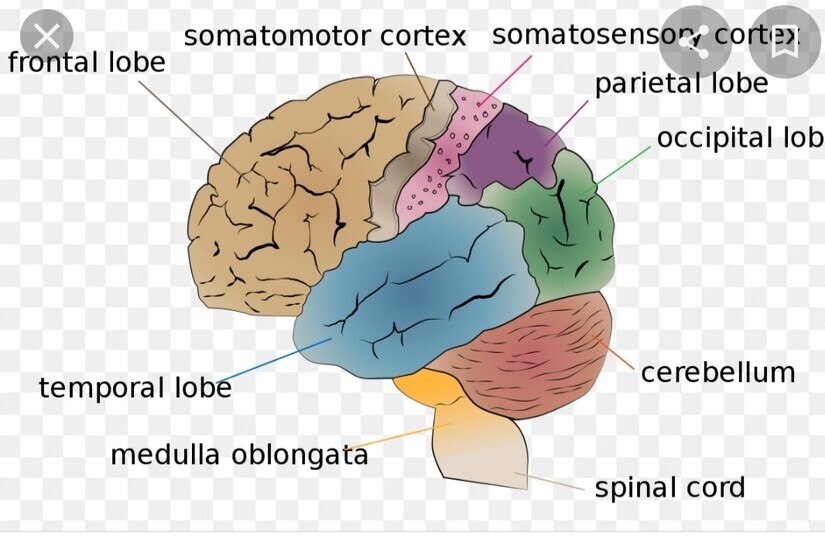
“The brain never heals; it doesn’t grow back; parts of it dies. I’m left with a hole in my head that folks don’t normally see,” she quips. “Feel this!”
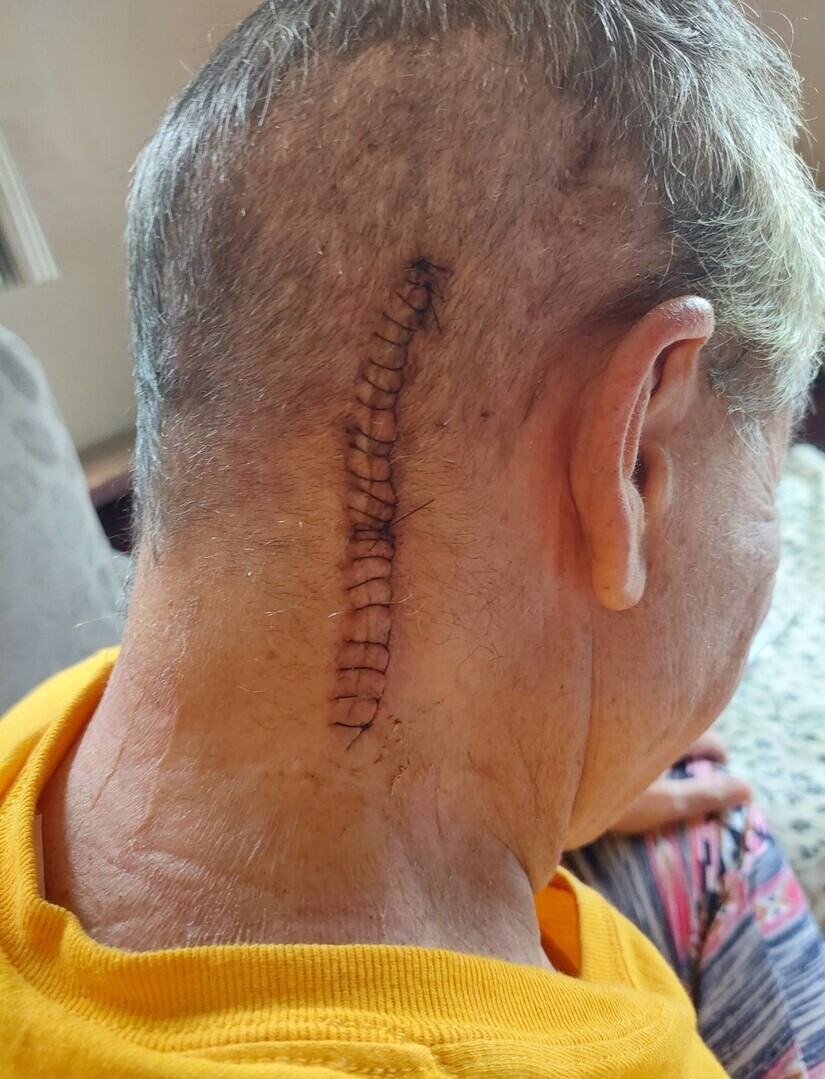
Part of her treatment involved placing a lumbar drain in the middle of her back to collect brain fluid that was leaking from the surgical site until the second surgery could be accomplished. Brain fluid, I learned, completes a path around the body’s torso every 4 hours.
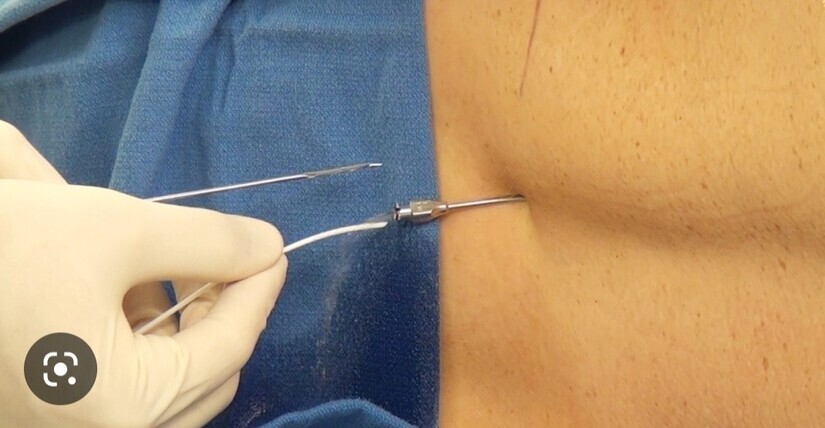
After spending a month in the hospital, she came home with a walker, entered rehab after in-home rehab, then physical therapy at home. Gigi has improved in regaining her vision and balance; the forgetfulness, nausea and dizziness remain to some degree, and she knows that improvement for most stroke victims occurs in the first 3-4 months, so whatever she’s experiencing now will probably be with her for the rest of her life.
“But they tell me that I had the best place to have a stroke. I can’t say I feel lucky; I’d feel lucky NOT to have had a stroke, but I’m pretty good physically. Only I can tell that I’m not the same,” she continues.
“The biggest challenge for me is emotional, in managing the depression caused by the physical assault to my brain. There’s psychological depression caused by circumstances or emotional trauma of some kind. And there’s neurological depression caused by a physical event.
“I have neurological depression. For five months, I’d cry all the time—for no reason. Six or seven times a day I’d break into sobs over things that others would just find sad. I didn’t want to go anywhere or see anyone; it was so disturbing and embarrassing. And exhausting. I didn’t permit friends to visit at the hospital or even after I came home,” she explains.
“But when John Fetterman entered treatment, I was inspired to get help. So, I belong to a stroke support group; I take medication and entered therapy with the doctors at Lehigh Valley.
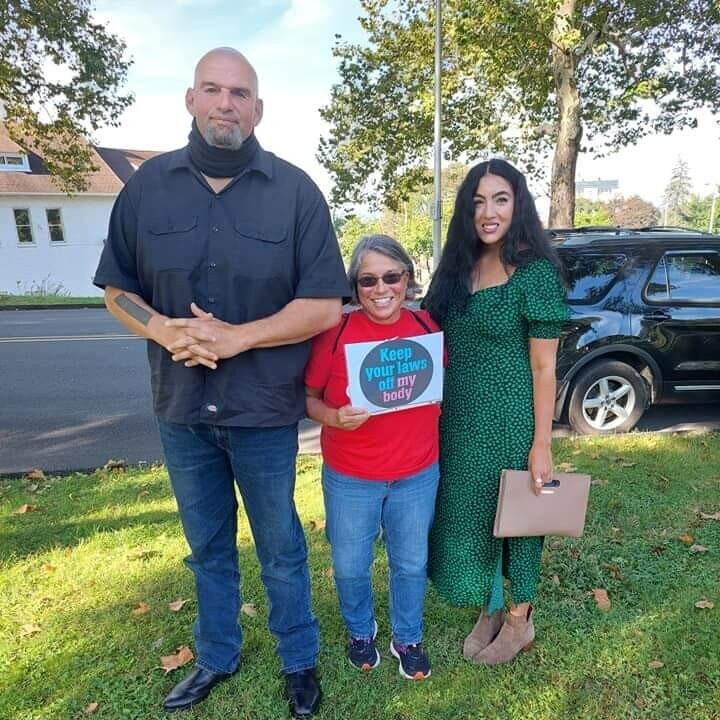
And while I love Lehigh Valley Hospital and was so impressed that there are lots of neurologists—there’s a specific neural ICU, for example, for neurology patients—they never mentioned the psychological part of having a stroke while the brain rewires.
Today, she recognizes that she’s changed. “I’m OK today with doing nothing. Having spent so much time in the hospital where I was not allowed out of bed, I’ve become used to a different pace. I’m OK with not doing much.”
Her active life that prior to the stroke was filled with dog walking and volunteering came to a halt, but she’s just started driving and volunteering again with Meals-on-Wheels and the Prison Society, for example. But she admits to “neural fatigue”; and, while she's down from three, three-hour naps a day and a full night’s sleep, she still naps when she’s home.
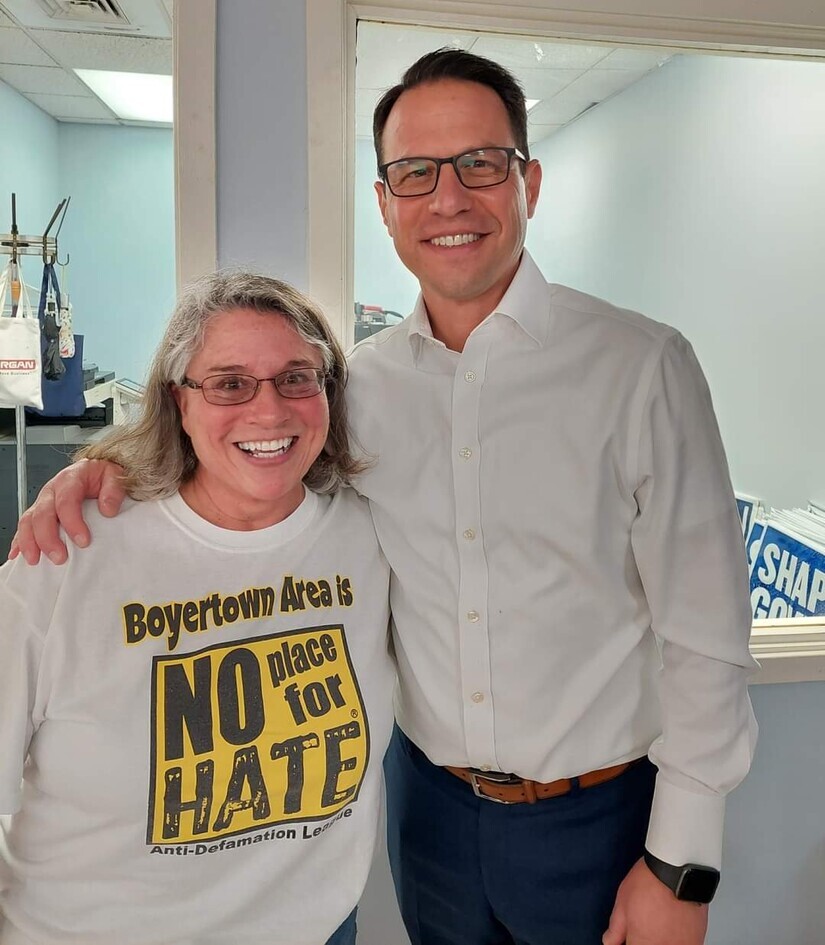
But slowing down was already in the plans. Gigi and her “wonderful” dog walking sidekick are ready to retire; she’s ready to consider selling the business “Gigi’s at Home Pet Care.”
COVID had taken a major hit to her business as people were home and could walk their own dogs. And, while the COVID crisis abated, remote working curtailed the need for dog walkers more permanently. Only 30% of her clients have returned since COVID—many of them have been with her throughout her entire career.
Gigi is grateful for the loyalty of her “wonderful” dogwalking sidekick and husband who took over and kept the business going during her hospitalization and recovery. “They were amazing,” she exclaims.
We ended our conversation talking about her career journey—first as pet sitter than dogwalker. “I love working the business—marketing and all that. And I knew early on that I wanted to switch from pet sitting to dogwalking because of the hours,” she explains.
“People want pet sitters so they can go away—on weekends and holidays. Dog walkers want you during their workday. And with my Master’s degrees in Human Services and Business, I knew to sell off the pet sitting business and focus on dog walking to have the life balance I wanted.”
Through the years, Gigi’s learned many things about dogs and their owners. “First, everyone will tell you how wonderful their dog is. And they may think their dog will behave for me as they behave for their masters which is not always the case.
“I can tell, for example, when a dog is leash-trained. And it’s important because dogs love our visits and don’t want us to go. I had one dog that played dead—I mean you’d really think he was dead because he didn’t want us to go. It was difficult to get him back in the house.

(Gigi sent me a photo a few weeks ago of a dog who "played dead" and reminded her of some of her clients.)
“I’ve learned not to take big dogs as clients. I can’t carry them. And sometimes in the middle of a walk, they refuse to budge. We’ve developed a technique using their treats to get them moving and home again. You throw the treat ahead of them; they will get moving to get it. Throw another one so they move again. But we’ve had some really tough walks over the years to walk certain dogs home again.
“We make subtle suggestions to owners like “I couldn’t find the treats today” and I often recommend dog training—but only training that relies on positive reinforcement. Any negative techniques may work for the moment, but won’t stick. And what we’ve found is that owners don’t always do the homework their trainers recommend.
“What I have found funny is that dogs will take on the personalities…and issues…of their masters. They get the same symptoms. If the master has certain digestive issues, the dog will too.”
Gigi offers a word for dog owners: "Please keep your pet on a leash. Your dog may be friendly and well-behaved with other dogs, but my dog may not be!" Off-leash dogs drive Gigi crazy.
On the topic of “Did you know?” Gigi schooled me that girl dogs will sniff one another’s butt end. Boy dogs sniff one another from the front.
While her mother doesn't approve, I especially loved the tattoo created from a comment she borrowed from Senator Mitch McConnell, one that captures her indomitable spirit and fortitude: “Nevertheless she persisted.”
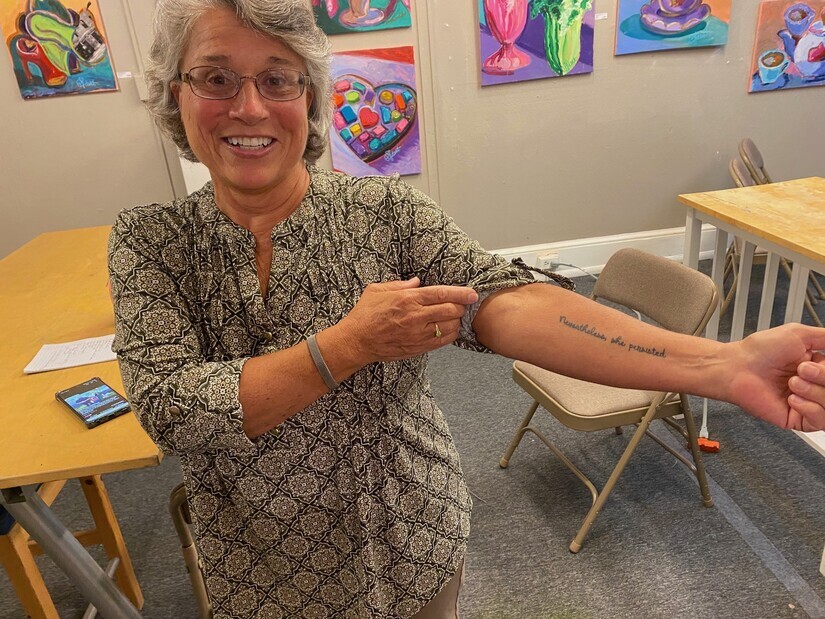
Science. Medicine. Dogs. My favorite topics. I learned and was inspired in my conversation with Gigi and wish her well in her continued recovery.